Home > Articles > The Archives > Ralph Stanley and the Clinch Mountain Boys
Ralph Stanley and the Clinch Mountain Boys
Reprinted from Bluegrass Unlimited Magazine
May 1971, Volume 5, Number 11
Part I: THE CLINCH MOUNTAIN BOYS
This is about Curly Ray Cline, Roy Lee Centers, Jack Cooke, and maybe me. Over the last twenty-five years there have been many Clinch Mt. Boys, but this is the present band and thus representative of the Stanley heritage. Since most readers are familiar with the musical history of almost all the musicians in the major bands, I’ll gloss over that part and do some personality sketches. The assumption is that understanding the man is a key to appreciating his music.
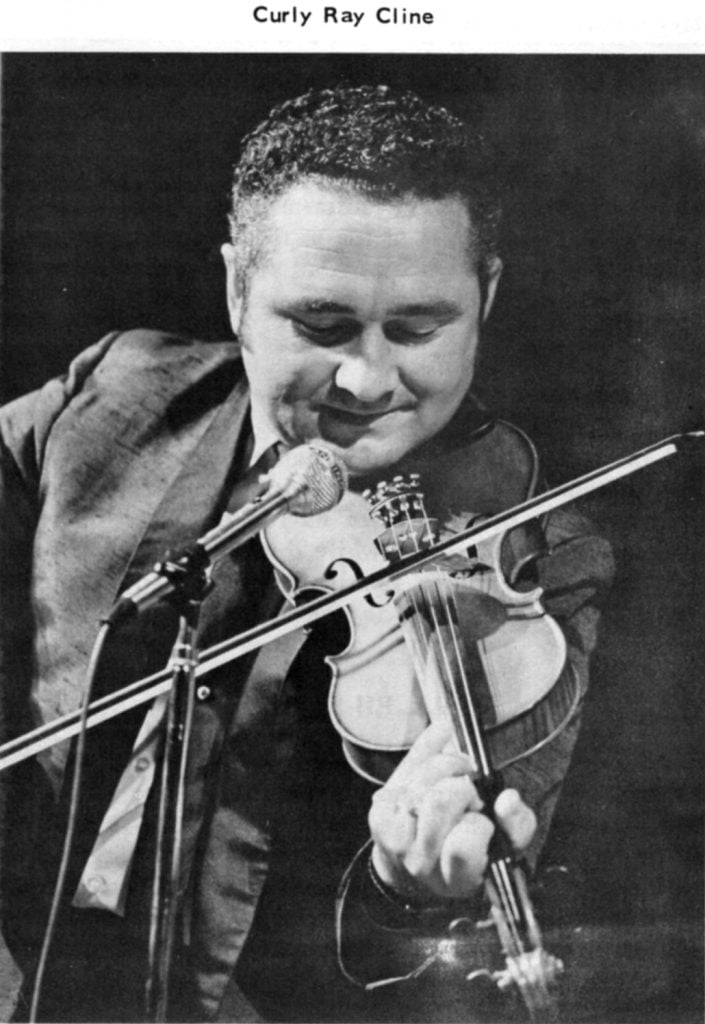
Curly Ray, the ‘‘Old Kentucky Fox Hunter”, is a political buff, ex-miner, born comedian, existentialist, and, alas, a fox hunter. When I first met Curly I thought I should talk to him about fox hunting and/or fiddling. This turned out to be like talking to Einstein about relativity or Ralph Rinzler about Bill Monroe. I abandoned that ship when I detected Curly’s interest in politics. But here the footing was only a little more firm, because Curly is not only in touch with the national and state scene but also knows who holds office and who he won it from in most of the cities and counties east of the Mississippi. When Curly loses you in conversation, however, he picks you up with a one-liner: ‘‘Boys, it’s too bad that the saxophone player for that band that won the old-time music contest had to be sick.” or ‘‘Jack, how many people are in the Cooke Duet now?” or looking for some tomato plants he had hidden under a tree, “Boys, they’ve gone; they’ve gone!” Curly will take a rib too and play along with it just for fun. One day in Oklahoma (110 degrees in the shade) Curly got up before anyone else in the motel and couldn’t get any hot water. We told him to turn the dial on the wall (an electric heater) all the way up. (“We don’t have nothin’ like that back home by the creek.”) Curly finally came out of the bathroom which was at least 175 degrees by then sayin’, “Boys, if you don’t turn that air-conditioner down we’ll all be sick.” An alarm clock never gets to go off when Curly’s around, and so he decided to make an album called Curly Ray Beats the Alarm Clock. I call this the existential album because Curly’s format was to have a hundred alarm clocks set to go off in the recording studio, but the listener would never hear them because Curly would “beat ’em” and shut them off.
Roy Lee is a man who occupies a unique position in bluegrass. By the nature of his job he is always in the shadow of Carter Stanley. Roy understands this and approaches it with admiration for Carter while seeing the need to fill his proverbial shoes as well as possible. I got to know Roy best at night; because he generally rode shotgun for me, and when we weren’t on the road we went “parking-lot-picking”’ together. I like Roy’s singing and if he was a little hoarse at some shows it was probably because I’d have a couple of hundred requests for him to do every time I got behind the wheel of the bus. To his credit he’d do every one. I think he was thankful to find out he could keep me awake just as well by taking Joe Frazier’s side in his fight with Cassius Clay.
A few weeks after I came along so did Jack Cooke. Jack added a new dimension to travelling at night, because now we had a trio. (Thank heavens this was never recorded.—How did Curly and Ralph sleep, or even stand it for that matter?) As junior members of the group, Roy, Jack, and I had a lot of fun at the festivals; and we spent a lot of nights pickin’ and singin’ ‘til the wee hours. Sometimes the senior members came looking for us to make sure we got our rest, but as often as not this only added a fiddle, banjo, and distinctive tenor.
How does the group see itself? They like to work together and get the job done. What could be a tremendous burden of hard travelling performances is enjoyable because each member knows he’s with friends. We once talked about the possibility of having the ugliest band on the road. We decided that while this may be true, there are certainly some close running seconds. The Clinch Mountain Boys take pride in the old-time music they play, too.
Part II: RALPH STANLEY
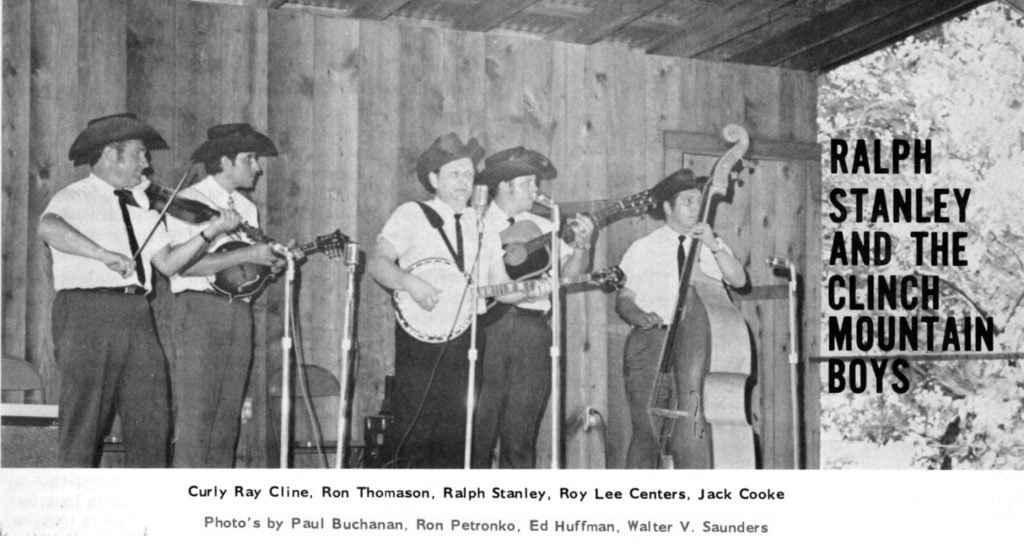
The Stanley Brothers were giants in the field of bluegrass music. They were among the first to record with three-finger banjo. They used lead guitar more than any other group. And for over a quarter of a century they stuck closely to the old-time mountain sound. They were the first to carry the music to college campuses. They played all over this country and have even made foreign tours, playing many folk festivals during the big folk boom.
Ralph describes my acquaintance with him at Berryville when someone asked him where he got his mandolin player; ‘‘He come up to me one day and said ‘I’ve got to pick.’ so I told him to get on the bus.”
I won’t say that I wasn’t afraid of him for a while. What do you say to a person who has written and/or played and recorded so many of the “standards” of bluegrass music? Many people mistake his lack of flamboyance for coldness. I was walking on thin ice, being careful not to make any mistakes; and finally before the Sunday crowd at Berryville I really muffed the kickoff to “Working on a Building.” I was ready to turn in my badge and walk down to the river and drown when I got my first glimpse of Ralph’s true nature. He said to Curly (so I could hear), “I guess Ron thought I announced ‘Old Joe Clark’ when we done ‘Building’”.
If Ralph represents a culture, it’s because he is that culture. Ralph is country. He likes horses, dogs, gravy and biscuits, trading and home. Ralph can’t leave the country because it goes where he does. He represents a way of life. You see it when he stops the bus to look for bear tracks, or spends some time pickin’ at a little country store 30 miles up the road. He offered a dollar for a quarter once just to get a trade out of one of us. Ralph’s appeal comes from the genuineness of his character.
People often wonder how Ralph views his music and career. To begin with, he fondly and admiringly remembers Carter. Frequently when talking about one thing or another he might say, “Now Carter would’ve done it this way.” or “Carter always said…” Ralph had to change in a lot of ways after Carter’s death. It is certainly a tribute to Carter and a credit to Ralph that he has done this so well. Ralph regards the Stanley sound as a separate entity. He is dedicated to preserving and developing this sound, and seeing that it does not stagnate. His main task is with his band.
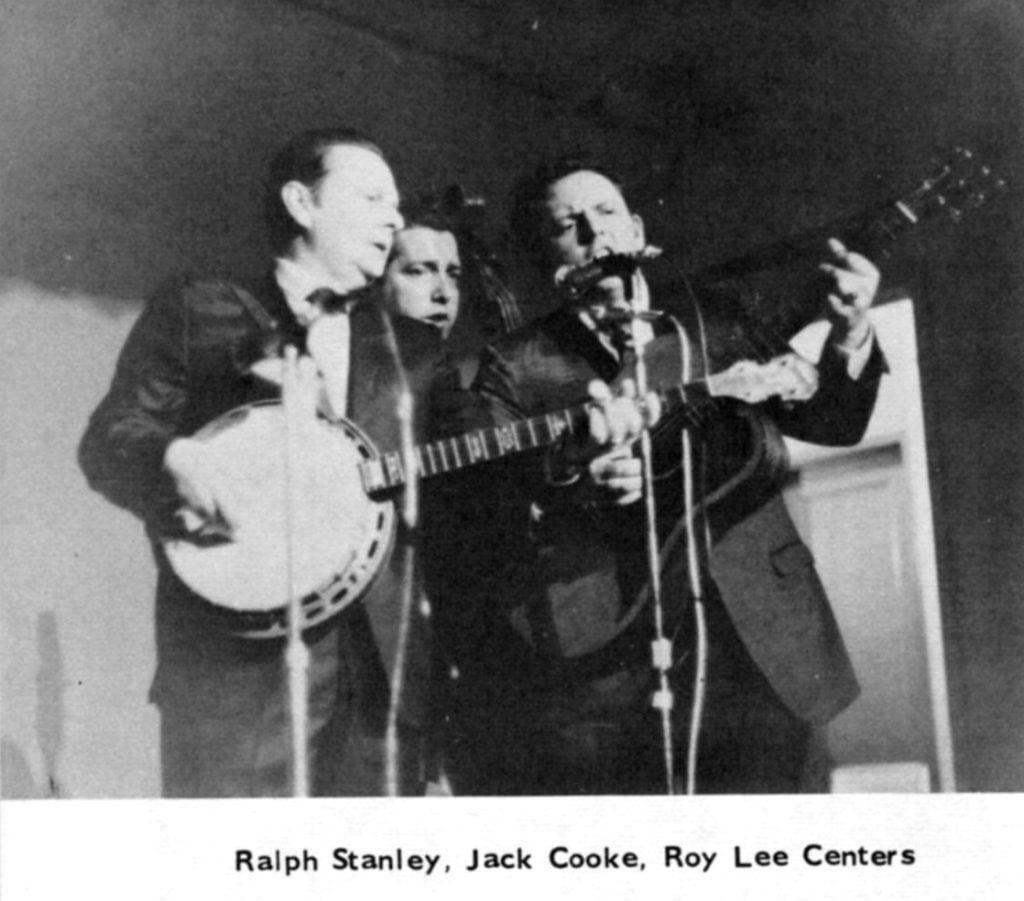
One doesn’t work for Ralph as much as he works with him. It doesn’t matter whether you’re practicing or laying carpet on the bus, Ralph is always there. I didn’t expect this at first, but I found out that Ralph expects it of himself. If you do a job, he appreciates it. If you don’t, he does it himself and never says a word. He is a leader because he knows that he can carry the load. And he does this at an amazing pace, whether musically or physically. The best you can hope to do is follow his example. He makes you drive yourself. How? I don’t know. Who wouldn’t do whatever was expected to hear Ralph sing “I am the Man, Thomas” or “Two Coats” acappella at three in the morning while driving a lonesome mountain road? I might add that no matter how long the day and how many hassles, I have never heard him be cross.
I don’t want to make Ralph sound too serious but he really enjoys his work. He’s looking forward to his festival on Memorial Day weekend. It’ll be in the country, at Ralph’s old home place. There will be a live fox race. Most important, Ralph is trying to make it the manifestation of what he feels a bluegrass festival should be. He wants the audience to enjoy the music as much as he does. Good luck Ralph!
Ralph Stanley and The Clinch Mountain Boys’ Tour of Japan
By Walt Saunders
[Photo’s courtesy of Nobuharu Komoriya—Country and Western Magazine—Japan, and Seija Wada]
Reprinted from Bluegrass Unlimited Magazine
May 1971, Volume 5, Number 11
Ralph Stanley and the Clinch Mountain Boys, along with Dick Freeland of Rebel Records recently returned from a whirlwind tour of Japan. This was Ralph’s first trip to the Far East, and he is one of the few big names in bluegrass to have appeared there.
Dick Freeland described their arrival: “We were met by a pretty good group of people at the airport. Everything seemed to be fairly well organized . . . always somebody there to look out for the luggage and instruments, and to make sure we got transported to the proper hotel or hall.
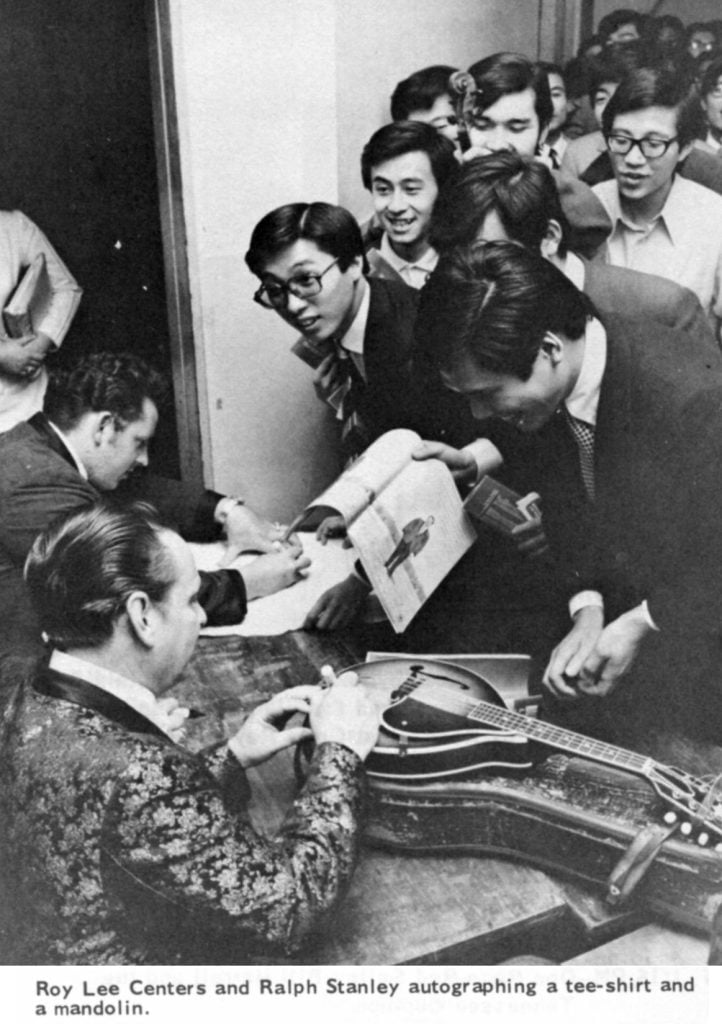
“The gentleman from the agency that sponsored it was really on the ball. He’s got to be the fastest human on two feet. Ralph nicknamed him ‘Tenbrooks’. I understand he handles tours of entertainers sometimes up to 40 people, although he claimed we carried as much luggage as 40 people.”
Ralph seemed pleased, as he told of their warm reception by the Japanese people, and the packed auditoriums everywhere they went. “They really give you applause, you know, and they won’t hardly let you get off the stage. Most of our audiences were young people … a lot of ‘em were high school boys and girls, and most all of ‘em could speak a little bit of English. Enough to say ‘Howdy’ or ‘How are you.’ Everywhere we went we had real big crowds, and they all seemed like they enjoyed it. Every show that we did, after it was over, it took us about 2 hours signing autographs.”
The itinerary included appearances in Tokyo, Kobe, Osaka, Kyote, and Fukuoka. “We musta done about 9 shows. I believe. We played our first night and our last night in Tokyo.” Tapes from the last show will become record albums, produced for Seven Seas (King of Japan), and possibly will be available here. They also were seen on network TV: “It was a program like the ‘Today Show’ here, on network all over Japan.”
The Japanese bluegrass fans displayed a comprehensive knowledge of the Stanley repertoire, and the band was kept busy at every show answering requests from the audience. “They requested a lot of songs that we done back through the years … a lot of them I’d forgotten about. They asked for ‘Old Mountain Dew’ and ‘Man of Constant Sorrow,’ songs like that.”
A surprising number of Stanley albums are currently available in Japan. “About all the record stores we went in, they had some of our albums. They’ve got albums over there that’s out of print here. They had the Hard Times album, and several more that you can’t buy here.” Everyone was near exhaustion from the strenuous pace connected with a tour of this type, and Dick, Roy Lee Centers and Jack Cooke were sporting painful sunburns they got in Honolulu. Nevertheless, the entire troupe was quite enthusiastic about Japan, especially Jack: “I enjoyed the food over there … I gained about 10 pounds.” Curly Ray Cline, in his own quite way, summed up the feeling of the band very nicely, when he commented: “I hope we get to go back.”
Share this article
1 Comment
Leave a Comment Cancel Reply
This site uses Akismet to reduce spam. Learn how your comment data is processed.
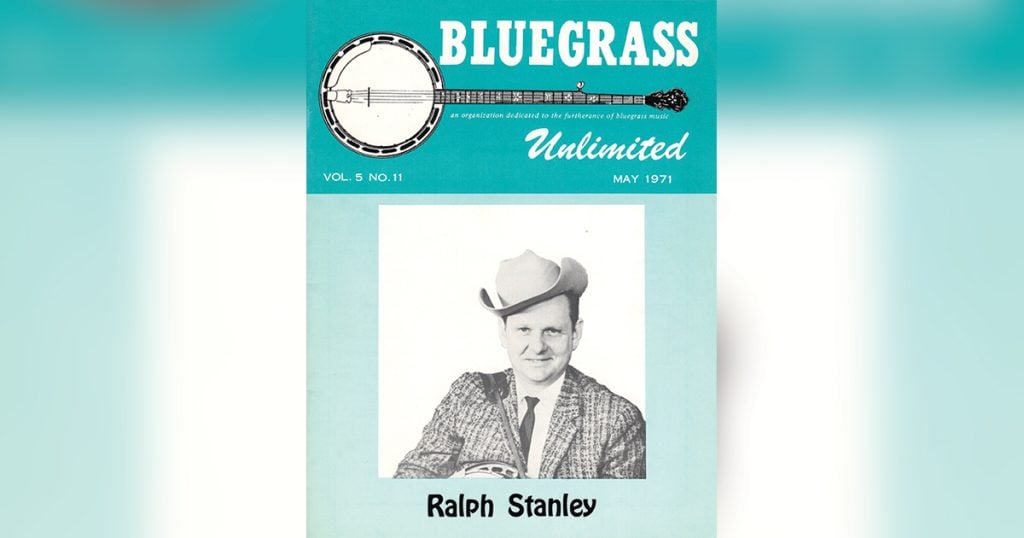
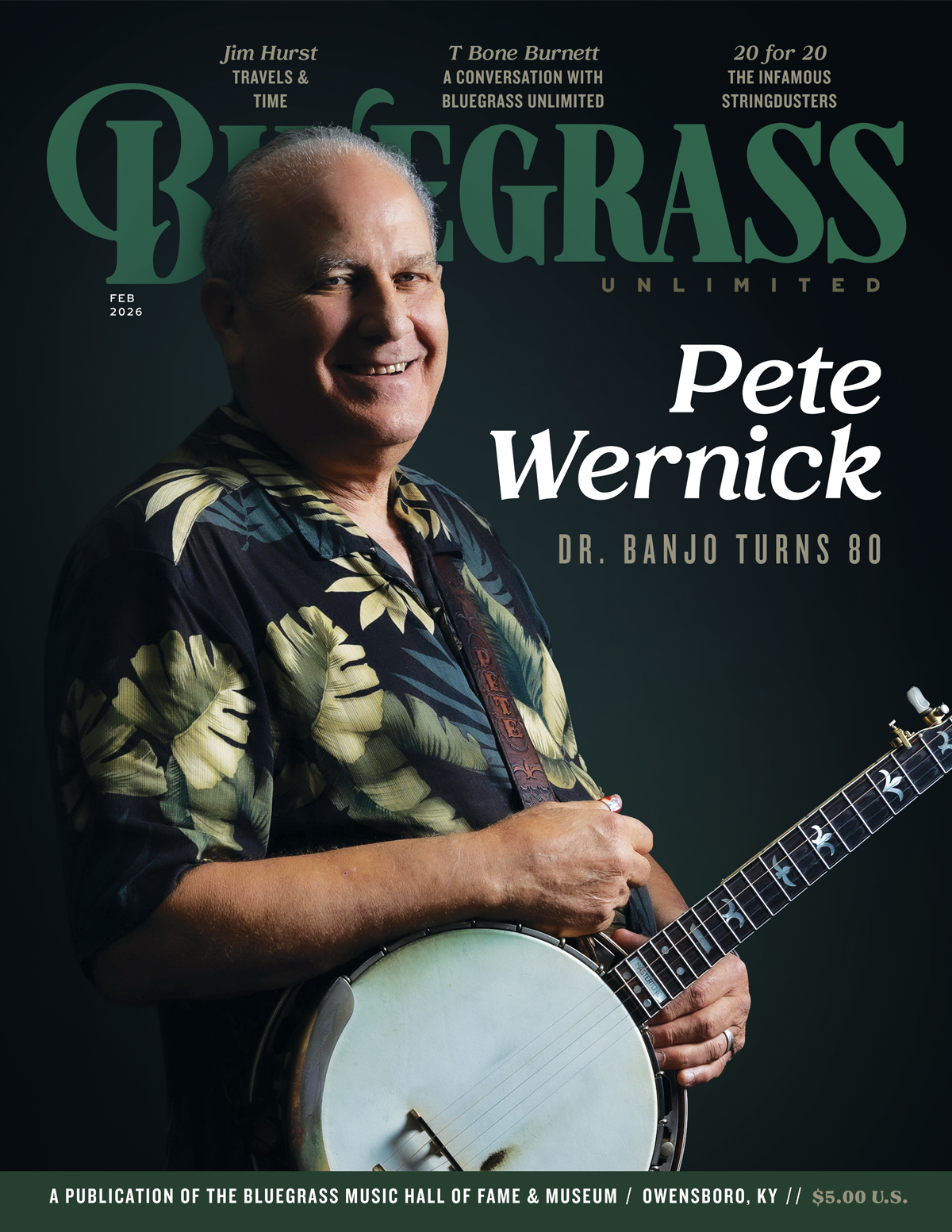
I love their music, one of a kind. The first time I saw Carter and Ralph was in 1956, they played at our 4 room school house in Drill, Va. and the charge was $.25 and I followed their music every since. I have met Ralph several times since then. I listen to his music just about every day on YouTube now.????????♂️????